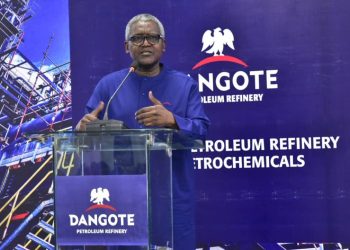Washington, DC — United Bank for Africa (UBA) chairman Tony Elumelu on Monday called for a continent-wide push to channel Africa’s own savings into growth, arguing that domestic capital—not aid—should fund the next phase of development.
Unveiling the UBA Africa White Paper on the sidelines of the World Bank/IMF Annual Meetings, Elumelu said Africa holds over $4 trillion in pension, insurance, savings and sovereign wealth assets that remain under-deployed.
“Africa does not lack capital. What we lack is coordination and commitment to channel it productively,” he said, framing the report as a roadmap to finance infrastructure, digital networks and green energy from within the continent.
Afreximbank President Benedict Oramah backed the call, urging wider use of local-currency financing to reduce exposure to exchange-rate shocks and external debt cycles. He highlighted Afreximbank’s Pan-African Payment and Settlement System (PAPSS)—which enables cross-border trade in African currencies—as a practical step toward financial integration.
Nigeria’s Minister of State for Finance welcomed UBA’s “thought leadership,” saying domestic reforms aim to stabilise prices, deepen capital markets and unlock private investment in energy, finance and small businesses.
The white paper argues that mobilising institutional pools—especially pension funds and insurers—can provide the long-term capital suited to infrastructure, manufacturing and digital transformation. Recommended measures include clearer project pipelines, risk-sharing vehicles, consistent regulation for institutional investors, and governance standards to crowd in both domestic and diaspora capital.
Elumelu, who also leads the Tony Elumelu Foundation, cast the agenda in human terms, citing a rising, entrepreneurial youth population:
“We have the resources. We have the talent. What we need now is the will to make it happen. Africa must finance Africa.”
The launch drew policymakers, global investors and development financiers. Organisers said the paper seeks to shift narrative and practice from aid dependency to self-financed transformation, aligning public reforms with private capital to accelerate bankable projects. As attendees rose to applaud, the message was clear: harnessing Africa’s own balance sheet is central to sustainable, sovereign growth.





















